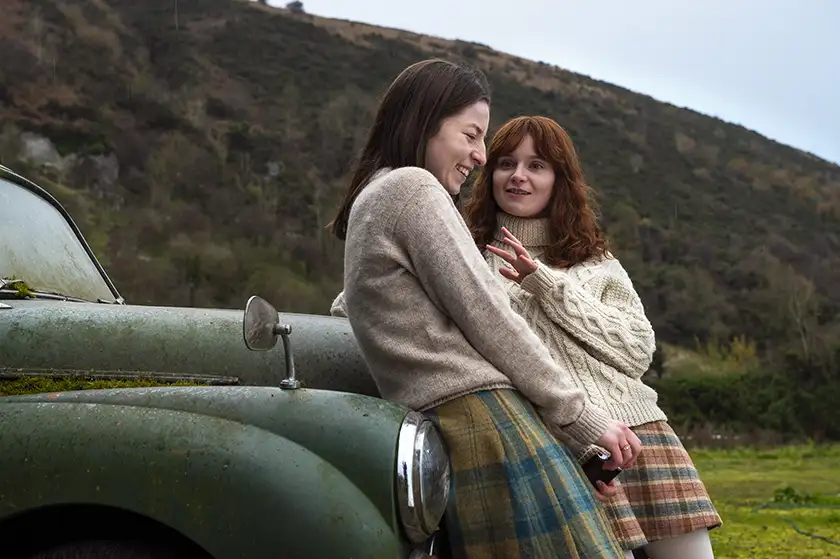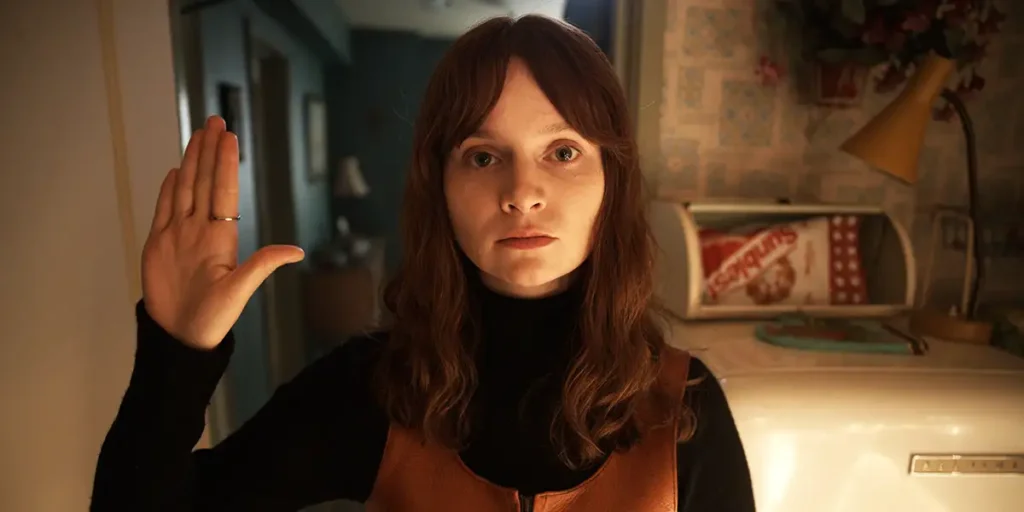Say Nothing is a blistering, tension-filled exploration of the Troubles that balances fact and fiction alongside two generations of terrific performances.
Showrunner: Joshua Zetumer
Director: Michael Lennox
Genre: History, Drama, Thriller
Number of Episodes: 9
Global Release: November 14, 2024
Where to Watch: Hulu /Disney Plus
Navigating the dramatisation of a political conflict is a tricky thing. There are often two sides, two opinions, two sets of beliefs, and two versions of events that don’t always coalesce into one cohesive whole. With Say Nothing, series creator Joshua Zetumer doesn’t seek to offer any definitive truths, and is instead telling one part of the story of a horrifically violent and traumatic period of Northern Irish history through the eyes of one woman.
Based on the book by Patrick Radden Keefe, Say Nothing takes place during the Troubles, a political conflict in Northern Ireland – although violence did occur in the Republic of Ireland and mainland Britain, too – that lasted over 30 years. Whilst often primarily attributed to being simply Catholics vs. Protestants, the Troubles were heavily entwined with the issue of national identity, and whether the island of Ireland should be united or Northern Ireland should remain under British rule.
Say Nothing spans almost the entirety of the conflict, but begins in 1972 with the abduction and subsequent disappearance of Jean McConville (Judith Roddy, of Derry Girls), a widow and mother of ten from Belfast, who was never seen alive again. The investigation into her disappearance is one of many narrative threads woven together throughout the series, but it is mainly centred around Dolours Price (Lola Petticrew, of She Said).
She, alongside her sister Marian (Hazel Doupe, of The Green Sea), have become disenfranchised with non-violent protests and are keen to do something to help support a united Ireland. As an art student and the eldest daughter of Catholic parents Chrissie (Kerri Quinn, of Kneecap) and Albert (Stuart Graham, of Wolf), Dolours’ sensitive nature hides a fierce desire to prove herself and be noticed.
So the sisters approach the leadership group of the Belfast contingent of the Irish Republican Army, Gerry Adams (Josh Finan, of The Gentlemen) and Brendan Hughes (Anthony Boyle, of Masters of the Air), to insist on the bigger role women can play in the fight for a united Ireland. They’re successfully recruited, and are soon participating in paramilitary violence by strategizing, transferring ‘touts’ – informants – across the border to be executed, and even smuggling explosives for car bombs.
Events are tied together via a series of secret interviews an older Dolours (portrayed by Maxine Peake, of Wendell & Wild) and Brendan (Tom Vaughn-Lawlor, of Peaky Blinders) are undertaking, in which they disclose dangerous details they had sworn to keep secret. For Brendan, it’s a chance to express his betrayal that Gerry (Michael Colgan, of The Regime), now a politician and the leader of Sinn Féin – an Irish republican political party –, continues to emphatically deny he was ever even a member of the IRA. For Dolours, it is much more of an attempt to assuage her guilt, navigate her years of trauma and atone by telling the truth, throwing Gerry under the bus is just a bonus.

Covering everything Say Nothing does over the course of just nine episodes is something of a mammoth task, but it’s one that Zetumer certainly doesn’t shy away from. The series’ writing team really effectively keep things tightly focused, never straying too far from Dolours and her immediate radius, whilst simultaneously offering a coherent picture of the cultural landscape at any given time. Things are never beleaguered by personal drama: everything is connected to politics. Even the way Dolours meets her eventual husband, actor Stephen Rea (Damien Molony), is in part thanks to a heavily political play he starred in.
And it’s that understanding of the importance the cause has to these characters, their absolute conviction in their beliefs and dedication to loyalty, that makes Say Nothing so compelling. The series doesn’t shy away from the violence, nor does it use it gratuitously or for shock value. Instead it directly engages with the horrific senselessness of it all, the weary cyclical nature of attacks and retaliations, and the series is much more concerned with the impact on its characters as it transitions through the 70s, 80s and 90s than the grisly details.
Characters are never presented as caricatures of the cause. Yes they do atrocious things, but it is never the intention to excuse them. Say Nothing consistently strives to keep its audience aware of the human beings underneath it all, and episode six, “Do No Harm”, is the series’ stand out example. Written by Clare Barron and directed by Alice Seabright, the female influence is heavily apparent as Dolours and Marian undertake a hunger strike whilst incarcerated in London. Dolours is tenacious, stubborn and combative as she is force fed, leered at by the male inmates, isolated from her sister, and ridiculed by staff. But Dolours is also a young, scared and vulnerable woman, accepting the consequences of their actions but starting to struggle under the weight of them.
Barron and Seabright are careful not to villainise her, but nor do they victimise her either. Instead, the episode encapsulates the series’ intention to present these people in a way that emphasises their complexities without ever excusing the heinous crimes they are completely complicit in. Because everyone, whether they do the things they do for the sake of Britain or Ireland, is multifaceted, and the bulk of Say Nothing’s narrative draw comes from the exploration of that.
The series is also really effective at consistently creating tension and intrigue, even if it shifts towards the ‘older’ characters in episode seven (“Theatre People”) a little too abruptly. From the outset, Say Nothing has presented everything under the narrational umbrella of Peake’s Dolours, and as it transitions fully into her perspective it does feel a little jarring to suddenly stop jumping back and forth. But Zetumer has paced the series so well that it’s a fleeting thought, because the intervening years haven’t eased the political landscape and have only exacerbated the lingering issues. While saying goodbye to the ‘younger’ generation feels sad in the moment, the ‘older’ generation takes over with almost seamless ease.
And it is a testament to the breadth of impressive performances across the board that the switch from Petticrew to Peake, Boyle to Vaughn-Lawlor and from Finan to Colgan, feels that way. The entire cast offer layered, thoughtful, powerful and poignant performances. The series’ focus on Dolours places Petticrew and Peake in the forefront, and both actors are more than capable of carrying that burden, but the supporting cast are barely a step behind. Boyle in particular, as a young Brendan, is incredibly captivating on screen. A slew of acting talent also appears throughout the series in smaller roles – Ian McElhinney (Game of Thrones), Rory Kinnear (Skyfall) and Laura Donnelly (Outlander), to name a few – and it creates such a rich, engaging and atmospheric environment, that it’s almost a shame when things come to an end.
Say Nothing is extremely aware of its position in telling stories from the Troubles. The interviews as a bridging device feel a little clunky at times, but they do help to keep things neat, coherent and, perhaps most importantly, allow its writers the opportunity to present a compelling narrative that doesn’t have to fictionalise too much historical fact. Every episode ends with a caveat – “Gerry Adams has always denied being a member of the IRA or participating in any IRA-related violence” – as a way of both preventing libel and as a way of reinforcing the fact that while these events are based on real people, real stories and real events, this – Say Nothing – is just good television and not to be taken as incorrigible fact.
But such is the nature of exploring political conflicts through the medium of TV. It is a constant balancing act. The desire to give audiences an effective narrative might war with the need to present as much detail and context as possible. Say Nothing is very effective and delicate in navigating that space, offering up an opportunity to explore the extremes people will go to for the sake of their beliefs through a compelling personal story of a young woman growing up and dealing with her traumas as an adult.
The Troubles cast a long, immeasurable shadow on the island of Ireland, and the ramifications and ripples of its violence are still felt today – seen in the final plea for information on the individuals still missing decades after the fact. Say Nothing is a blistering, poignant, shocking and inherently interesting example of how care, detail and sensitivity can give entertainment the power to really impact the understanding of a political issue. There will be detractors and opposition, as well as acknowledgment and appreciation, but that feels like the point.
We can only hope for truth, reconciliation and a continuing peace alongside the good telly. Not just for Ireland, but for the planet.
All 9 episodes of FX’s new limited series Say Nothing premiere Thursday, November 14, 2024 exclusively on Hulu in the US, and on Disney Plus in the UK and Ireland.

